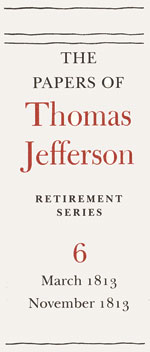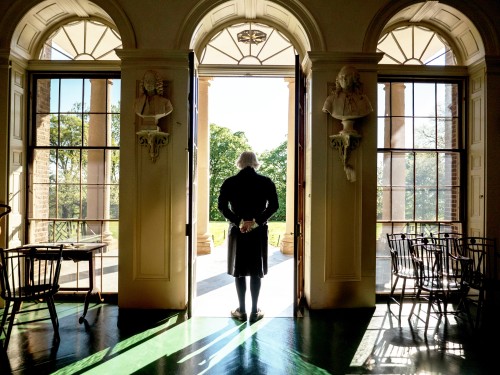 Detail from spine of Volume 6, Retirement Series The 516 documents printed in this volume cover the period from 11 March to 27 November 1813. Although Thomas Jefferson assured his old friend George Logan on 3 October that "an entire confidence in the abilities and integrity of those now administering the government, has kept me from the inclination, as well as the occasion, of intermedling in the public affairs, even as a private citizen may justifiably do," he found it impossible to disassociate himself from politics completely. As the conflict with Great Britain dragged on, he recommended to President James Madison that gunboats be used to protect the Chesapeake Bay and wrote three long letters to his son-in-law John Wayles Eppes, the chairman of the Ways and Means Committee of the United States House of Representatives, urging the moral necessity of providing for the rapid repayment of the national debt and reining in a banking system he regarded as corrupt.
Detail from spine of Volume 6, Retirement Series The 516 documents printed in this volume cover the period from 11 March to 27 November 1813. Although Thomas Jefferson assured his old friend George Logan on 3 October that "an entire confidence in the abilities and integrity of those now administering the government, has kept me from the inclination, as well as the occasion, of intermedling in the public affairs, even as a private citizen may justifiably do," he found it impossible to disassociate himself from politics completely. As the conflict with Great Britain dragged on, he recommended to President James Madison that gunboats be used to protect the Chesapeake Bay and wrote three long letters to his son-in-law John Wayles Eppes, the chairman of the Ways and Means Committee of the United States House of Representatives, urging the moral necessity of providing for the rapid repayment of the national debt and reining in a banking system he regarded as corrupt.
Despite his concern that the combined effect of the British naval blockade and the worst drought in half a century would ravage his personal finances, for the most part Jefferson remained active, optimistic, and healthy. As he commented to Abigail Adams on 22 August, except for recurring bouts of rheumatism "I have enjoyed general health; for I do not consider as a want of health the gradual decline & increasing debility which are the natural diathesis of age." The septuagenarian found it difficult to walk long distances, but his love of horseback riding remained undiminished, and during this period he traveled three times to his beloved Poplar Forest retreat. Jefferson also continued to entertain a steady stream of visitors at Monticello, including the noted Portuguese botanist José Corrêa da Serra, who made the first of many visits to the mountaintop in the summer of 1813. Such friendships aside, family remained a high priority for the ex-president. He happily supervised the education of his grandchildren and other relations, procured a gold watch for the seventeenth birthday of his granddaughter Ellen W. Randolph (Coolidge), and exchanged more letters than usual with his younger brother Randolph Jefferson, who lived nearby in Buckingham County.
The volume and diversity of Jefferson's other correspondence also showed no sign of abating. Pierre Samuel Du Pont de Nemours forwarded a French translation of the treatise on education in the United States that he had written at Jefferson's behest more than a decade earlier. Although he claimed to have little affinity for grammar, exchanges with John Waldo and John Wilson reveal Jefferson's love of neologisms and well-developed ideas about how to improve English orthography. The engineer and inventor Robert Fulton sent a detailed description of the military potential of submarine weaponry, and Fulton's business partner, the entrepreneur John Devereux DeLacy, requested Jefferson's endorsement of their plan to use steamboats to improve navigation along the Atlantic seaboard. In a 13 August letter to Isaac McPherson, Jefferson sought to restrict the scope of Oliver Evans's milling patents with an eloquent call for limits on government-sanctioned intellectual-property rights. Furthermore, Jefferson responded favorably when Paul Allen, who was in the process of preparing Nicholas Biddle's History of the Expedition under the command of Captains Lewis and Clark for publication, asked for biographical information about the two famed explorers. While he had little to offer Allen on William Clark, Jefferson supplied an account of Meriwether Lewis's life and career on 18 August that includes a penetrating study of Lewis's mental state leading up to his apparent suicide. Jefferson's narrative, which was printed in 1814 in the introductory section of Biddle's work, remains among the most frequently quoted primary-source documents regarding his former private secretary.
Finally, this volume contains the most intense period of communication between Jefferson and John Adams during their many years in retirement. Adams, who firmly believed, as he wrote on 15 July, that the two men "ought not to die, before We have explained ourselves to each other," sent Jefferson twenty-five letters between the latter part of May and the end of November, and Jefferson reciprocated with six lengthy replies. A few tense moments resulted when the older statesman read several decade-old letters from Jefferson to Joseph Priestley critical of Adams and his administration, which appeared without Jefferson's prior knowledge or permission in the recently published Memoirs of the Late Reverend Theophilus Lindsey. In general, however, Adams and Jefferson enjoyed considerable success in steering clear of recent political controversies. Instead, their letters abound with wide-ranging discussions of government, philosophy, religion, and a host of other topics. These exchanges, while sometimes threatening to degenerate into intellectual one-upmanship, provide real insight into their respective worldviews and their hopes and fears for the young nation they had done so much to create.
Volume 6 available through:
UVA Press Rotunda (index included; subscription required)
Founders Online (index omitted; no subscription required)
COPYRIGHT NOTICE: Published by Princeton University Press and copyrighted, ©, by Princeton University Press. All rights reserved. No part of this book may be reproduced in any form by any electronic or mechanical means (including photocopying, recording, or information storage and retrieval) without permission in writing from the publisher, except for reading and browsing via the World Wide Web. Users are not permitted to mount this file on any network servers.
